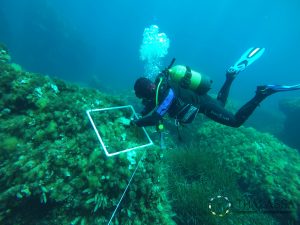
THALASSA research philosophy rests in the understanding of marine ecosystems, their conservation and management towards sustainable development. We favor a multidisciplinary approach in research, with field ecology and ecotoxicology methods and laboratory techniques of molecular and cellular biology and biochemistry.
Some themes and methods we propose as customized research services:
Assessment of biological diversity and spatial structuring of populations and marine communities:
-
- data collection on density, size and biomass of marine organisms using UVC (underwater visual census);
-
percentage cover assessments of sessile benthic communities within quadrats
Estimation of the impact of recreational fisheries on vulnerable species:
- anonymous questionnaires
Assessment of the economic status of fisheries within and around MPAs:
-
-
Monitoring and collection of information on fishing landings
-
- Fishermen questionnaires
Measurement of the effects of stress in marine ecosystems through molecular and biochemical tools:
- DNA & RNA extraction, bacterial culture
- Enzymatic activity

